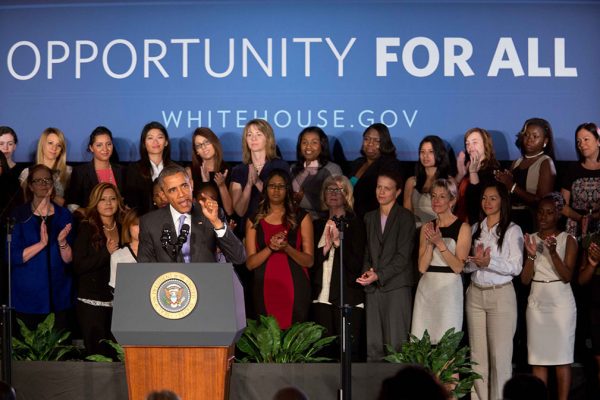For decades the Democratic Party has performed elaborate sleights of hand—political bait and switch—to produce the “U-shaped” coalition that Jacob Hacker and Paul Pierson discuss. That’s because policies and other actions taken to secure affluent suburban voters tend to come at the expense of poor and working-class voters, yet to make the coalition hold, the latter need to be sold a story about why the policies and actions were in their best interest. For Democrats, and Biden in particular, this has long meant portraying overly bureaucratized, means-tested policies as “redistributive” and pro-capital policies as “increased public investment.”
Bernie Sanders has shown how another way is possible. In the 2016 Democratic primary, he won key states like Michigan and West Virginia by taking on corporate power, treating basic needs like health care and housing as universal rights, and adhering to a consistent policy standard: if it was good for working people, he was for it; if it was bad for them, he was opposed. That commitment to public investment and redistributive policy constituted a real “U-turn” from the bipartisan neoliberal consensus. It is true that Biden has denounced trickle-down economics, stood by unions, and made important regulatory and legislative gains—surely, in part, as a response to the incredible popularity of the Sanders movement and Hillary Clinton’s loss to Donald Trump. But Biden has also failed to champion a genuinely progressive agenda, further entrenched austerity as the prevailing worldview, and stayed the course on the privatization efforts of his predecessors.
Take Medicare for All, an actually redistributive program that would generate large income gains for middle- and working-class people. In 2020 four of the six Democratic senators running for president cosigned Bernie’s 2017 Medicare for All bill—the first none other than Kamala Harris. But Biden disparaged the legislation as fiscally untenable and vowed that if it passed both chambers of Congress, he would veto it. Like Obama, he promised—and since has reneged on—a public option. As president, Biden has managed to seem less of an austerity hawk, in part by guaranteeing some forms of health care coverage and other vital forms of pandemic relief. But rather than make these much-needed programs permanent, he signed legislation kicking at least ten million people off their health care plans, including millions of children. He knew that doing so would send the health care system into disarray, but he went ahead with it anyway.
Now, Biden is doubling down on an Obama- and Trump-initiated Medicare privatization scheme that is duping people with dishonest advertising and forcing hundreds of thousands of people onto new for-profit plans without their consent. For seniors and people with disabilities, this is sure to result in unexpected costs for routine procedures, wrongful denials of care, price-gouging, and more illness, confusion, and misery. In his speeches, Biden has rightly excoriated Wall Street’s takeover of nursing homes after investigations have revealed horrific conditions for seniors living under the management of private equity—specifically the Carlyle Group, a major force behind Medicare privatization. What, then, do we make of Biden and his family spending Thanksgiving dinner at the multimillion-dollar home of Carlyle founder David Rubenstein?
In making their case, Hacker and Pierson suggest we must give the Democrats credit for the progressive elements of BBB that tragically perished only due to the intransigence of Kristen Sinema and Joe Manchin. This argument presumes a maximalist effort on the part of Biden and other party leaders to get the agenda passed. I see little evidence this was the case.
In fact, I don’t think Biden even intended for the progressive features of the bill to pass. When BBB was rolled out, Democrats controlled the presidency, the House, and the Senate (however narrowly). After the Senate passed the corporate-friendly infrastructure bill—with tens of billions in new subsidies for the fossil fuel industry masked as climate solutions—the party’s progressive wing in the House was forced to use it as a bargaining chip to get the social spending bill passed (itself laden with means testing, tax credit frameworks, and public-private partnerships). A “problem solvers caucus” headed by Democratic Congressman Josh Gottheimer lobbied against the social spending bill, raking in major fundraising hauls from donors opposed to its tax increases.
To resolve the impasse, Nancy Pelosi engaged the Congressional Black Caucus in the familiar strategy of pitting racial justice—in this case, voting rights—against progressive economic policy. The result was that the infrastructure bill passed into law, both social spending and voting rights reform were cast aside, and Democrats went full throttle on January 6 investigations. Should we give Biden credit for a bold agenda on redistributive social spending when there is no evidence that he fought against these “problem solving” solutions? He certainly knew what Gottheimer and Pelosi were up to. What we can be sure of is that Biden intended to say that the Democrats had tried—a politically convenient bait and switch.
The subsequent Inflation Reduction Act (IRA)—branded as a historic effort to combat inflation, the deficit, and climate change all at once—has by all accounts brought unprecedented investments in clean energy. Still, climate experts warn that those investments fall far short of the levels needed to curb the climate crisis, especially since emissions from Biden-approved fossil fuel projects cancel out any potential progress. Under Biden, the United States is on course to significantly expand oil and gas production, and Biden himself has nearly kept pace with Trump in granting permits for drilling on public and tribal lands. The climate disasters that are sure to result will hurt poor and working-class people the most—from lost jobs and earnings to interrupted access to public programs to housing and food insecurity.
The IRA also promises to accelerate private ownership of our infrastructure by global asset management firms. Biden’s own National Infrastructure Advisory Council, led by an investment banker, just recently called for the privatization of our water systems. The Biden transition signaled this when they hired BlackRock alums to key positions in the White House and Federal Reserve, spurring journalists to dub BlackRock “the fourth branch of government.” Privatizing what should be public works is not redistributive; it’s a means of subsidizing corporate investment while “externalizing” risk onto everyday people.
What does all this mean for the election later this year? Democrats and Biden could win if they did make some actual U-turns. First, the president must make an immediate and unequivocal U-turn on Gaza. Many of Biden’s young and progressive voters are haunted by the split screen of the mass killing of Palestinian children alongside his hugging of genocidal maniac Benjamin Netanyahu. That—coupled with the possibility of Democrats trading xenophobic immigration reform to get Republican votes for more military aid for Israel and Ukraine—will likely be a bridge too far for many progressives to turn out to vote for Biden.
Beyond the humanitarian catastrophes in Gaza and at the border, there is the point Cardi B recently made when she criticized Biden for bankrolling two wars while refusing federal relief to New York City in the midst of its own humanitarian crisis and devastating budget cuts in sanitation and other public services. Her stark warning that “we are gonna be drowning in . . . rats” reflects a common view among working-class people that their leaders simply don’t care about them.
That contradiction has become easy fodder for Trump, who is painting himself as both the antiwar president and savior to those left behind. At a time when homelessness, hunger, and evictions are soaring and when a vast majority of people feel financially stressed, Democrats and their pundits would do well to stop insisting that the economy is doing great and things could be so much worse. Instead, they need to give up the bait and switching over half measures and unrig government so that it serves the interests of the public good.
Boston Review is nonprofit and relies on reader funding. To support work like this, please donate here.






